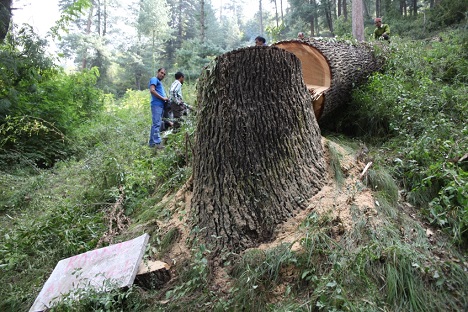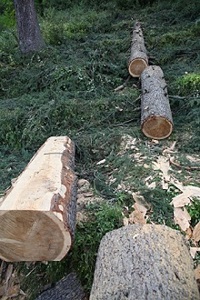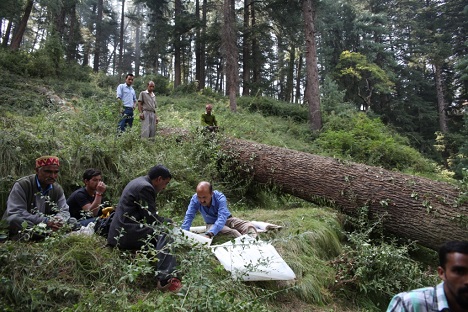Kullu residents fume as centuries-old deodar tree chopped down at Roerich estate

The centuries-old deodar tree that was chopped down in the Roerich Naggar estate. Source: Alexander Tomas
A centuries-old cedar tree was chopped down in the picturesque estate of the Roerich family in Naggar, Himchal Pradesh, witnesses said today. The incident sent shockwaves among the local community, for whom cedar trees are sacred, as well as Indian and foreign tourists who visited the estate for the birth anniversary of Nicholas Roerich.
The caretaker of the estate, Kunal Brahma decided that the huge tree needed to be cut down, since he assumed that it was too old and could fall and cause damage to some of the estate’s buildings. However, locals and tourists told RIR that one look at the huge trunk, lying on the ground, was enough to ascertain that the cedar, which is locally called deodar (“divine gift” in Hindi), did not threaten any buildings.
 |
| Source: Alexander Tomas |
Locals say this was a completely healthy, beautiful and strong tree growing on the hillside, about 30 metres from the building housing the Urusvati Himalayan Research Institute, which was founded 85 years ago. Local botanists believe that the tree still had a long life span.
In responses to frantic queries from Naggar residents, forest department officials from the Kullu Valley confirmed that Kunal Brahma applied for permission to cut down the tree. The department, however, categorically denied permission.
Residents and visitors to the Roerich Estate expressed dismay at the caretaker’s decision, which is being seen as brash and contrary to his direct duties related to the preservation of the integrity of the estate. At the same time, he ignored the current strict environmental laws of the state, which prohibit the cutting down of deodars – even on private property, without obtaining appropriate permissions from the authorities. Violators face a large fine or even jail time.
This incident is also perceived as a cynical abuse of ancient spiritual traditions of the local worship of the Deodar, sacred groves of which are found in every mountain village. Such a cedar could fetch about 4 Lakh rupees (around $6500), and that is why these trees have become a target of poachers. The land mafia is believed to be very active in the state of Himachal Pradesh and deforestation poses a serious threat to the state’s pristine nature.
“We fully share the feelings of the Indians, and all who cherish the legacy of our great compatriots,” said the Ambassador to India Alexander Kadakin, one of the founders of the International Roerich Memorial Trust (IRMT), and its current vice president. “Especially outrageous and alarming is the fact that such a blatantly cynical act, recognized in the state of Himachal-Pradesh as a crime, was committed by a caretaker of the estate – one of those people who are directly responsible for the safety of the memorial, including the museum house and the priceless paintings of Nicholas Roerich and his son Svyatoslav, which are inside. The embassy will insist that local authorities conduct a thorough investigation into this incident. The guilty must be punished.”
Kunal Brahma could not be immediately reached for comment by RIR as repeated calls to his office remained unanswered.
Source: Alexander Tomas
The IRMT was founded over in July 1992 to maintain the old estate, which has always been an important cultural centre for Indians from all strata of society. In the 1940s, Jawaharlal Nehru and Indira Gandhi visited their friends, the Roerich family, and made plans for the creation of an Indo-Russian people’s friendship association. The estate is a major spiritual and cultural centre and attracts over 100,000 visitors from around the world each year.
Nicholas Roerich and his wife Helena Roerich came to the Kullu Valley in late-1928, at the end of their Central Asian Expedition. When they first came to the house, it was empty, and in one of the rooms they spotted chairs with the initials H.R. The furniture belonged to the former owner of the house - Colonel Henry Reynih. However, Roerich could not help but notice the coincidence. They bought the estate and lived there until 1947, that is, until the passing away of Nicholas Roerich.
All rights reserved by Rossiyskaya Gazeta.
Subscribe
to our newsletter!
Get the week's best stories straight to your inbox

